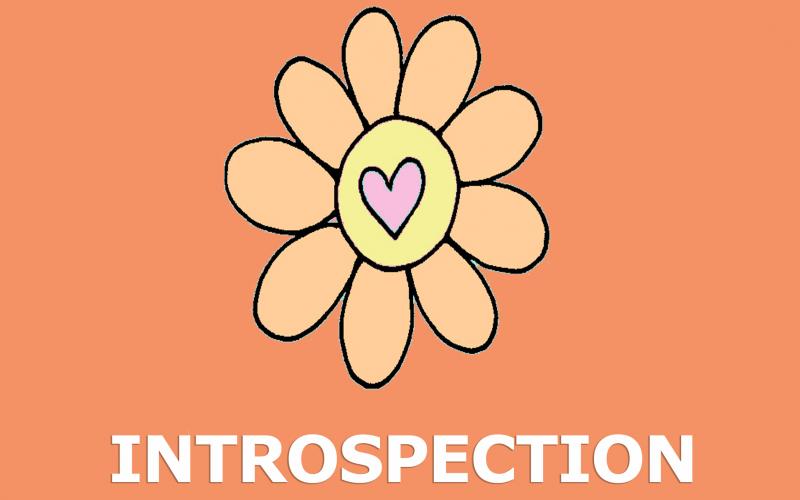THE VALUE OF INTROSPECTION
Pause and silence are the gateway to introspection

THE VALUE OF INTROSPECTION
The habit of sitting quietly, observing one’s emotions and flow of thoughts gives rise to the invaluable skill of introspection which fosters tranquillity and calm and promotes a state of mindfulness, the capacity to “be fully present to oneself”, thus creating space for new understanding. This ability to “look within” (the root meaning of the word introspection), promotes self-awareness; we become conscious of our feelings, impulses, desires and reactions, and of the push and pull of the thoughts behind them, grasp our all-round personality and character traits, and learn how to monitor our weaknesses and make the most of our strengths.
The role of pause and silence in introspection
Pause and silence are the gateway to introspection. When pausing, we exercise the will to stop our thinking process to avoid the automatisms that occur impulsively and sometimes put us at risk of erring.
However, the single act of interrupting the process is not enough because as long as our mind is actively involved in such automatisms, it is very easy to mechanically repeat the same tendencies in how we think, feel and act.
This is why, after pausing, it is essential to be silent, that is to say to prevent the mind from running after our emotions and thoughts like a “rider riding a runaway horse”.
From impermanence to permanence.
By fixing our attention in a simple but sustained act of observation, one manages to penetrate a new dimension of awareness and perceive the fundamental quality of the world in which we live: impermanence. We grasp the way in which every thought, emotion and sensation appears to then disappear, leaving space for new ones, coming and going as the clouds come and go in the vast sky.
So, while in the beginning introspection aims at self-observation and self-analysis through the discovery of the phenomena we perceive within ourselves, it moves deeper in search for a higher Truth. This is why it is sometimes referred to as "Soul-searching" or “Self-inquiry”, as both point to the revelation of a higher state of consciousness that unlike the former is permanent and immovable.
Thus, systematic introspection leads us towards the realisation of our truer, deeper Self; we understand how the thoughts, feelings and emotions previously perceived or experienced are actually distinct from us, we are not them. Sathya Sai beautifully emphasizes the need to reach this understanding when He says:
"Lotuses cannot live outside the water; however, they do not allow water to enter them. Be in life but see that life is not within you. This is the secret of a successful life..." Sathya Sai - April 3, 1967
How does introspection help us in our day to day life?
The activity of introspection is “internal” and as it ripens we learn to relate more wisely to the outside world. In fact, as we master ourselves through self-observation, we enhance both social skills and social awareness, which foster good relationships and a rapport with the world around us.
When the process of introspection is coupled with Human Values, we learn to harmonise our thoughts with our Spiritual Heart, the seat of Human Values, and to act in accordance with them. An attitude that kindles inner peace, which in turn enables us to discern and make the right decisions. Such a character – built on self-mastery and unity of thought, word and deed – leads us from introspection to self-inquiry, and, by exploring the real substance of the Self we grasp our True Identity, which lies within the soul of our very own being.
A similar depth of introspection expands our understanding and raises our awareness connecting us to our Higher Self, to our inner light, and to a Reality beyond thoughts, emotions and sensations. And, through the careful observation of our overall being, we get to know that these experiences, which do not exist permanently, do not constitute our true being. It is in this light that introspection represents a bridge towards new insight, which starts from individual self and reaches out towards a more universal awareness of being part of one unified Divine Consciousness.
Today’s global society, which is moving more and more outward from the inner core of humanity, would greatly benefit by promoting the art of introspection since the very onset of schooling. To encourage children to learn to pause and be silent, refer to one’s spiritual heart for advice, reflect on one’s behaviour and keep watch on one’s reactions, draw out one’s internal strength and the inherent wisdom of the Human Values of Truth, Right Action, Peace, Love and Nonviolence.
The Man in the Glass, by Dale Wimbrow
When you get what you want in your struggle for self
And the world makes you king for a day
Just go to the mirror and look at yourself
And see what that man has to say.
For it isn’t your father, or mother, or wife
Whose judgement upon you must pass
The fellow whose verdict counts most in your life
Is the one staring back from the glass.
He’s the fellow to please – never mind all the rest
For he’s with you, right to the end
And you know you have passed the most difficult of tests
If the man in the glass is your friend.
You may fool the whole world down the pathway of years
And get pats on the back as you pass
But your final reward will be heartache and tears
If you’ve cheated the man in the glass.
DOCUMENTS & PUBLICATIONS
-
EDUCÆRE HANDBOOK
Introduction to the Sathya Sai Education in Human Values programme, known also as Sathya Sai EDUCÆRE.